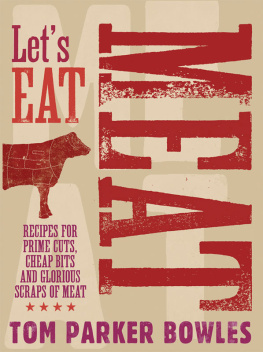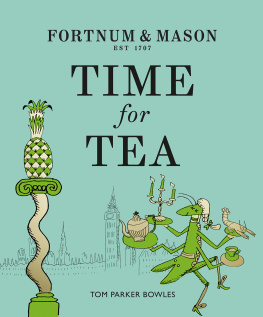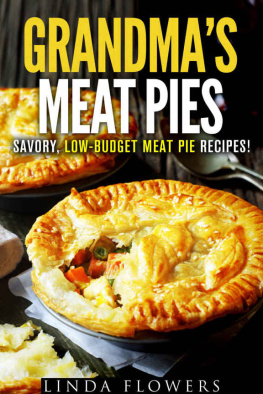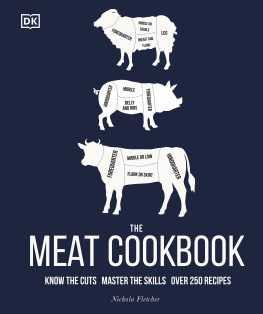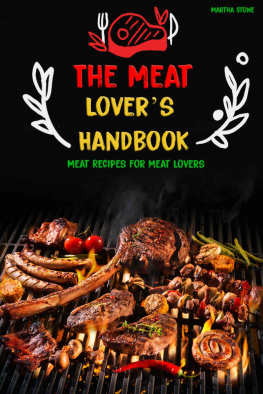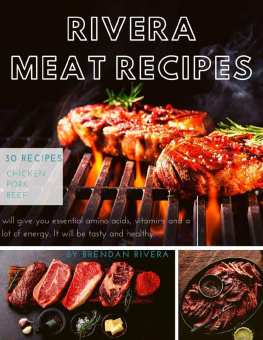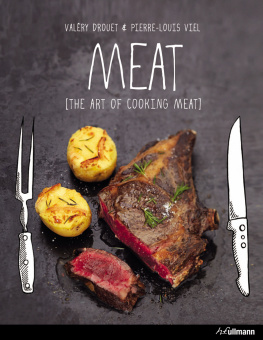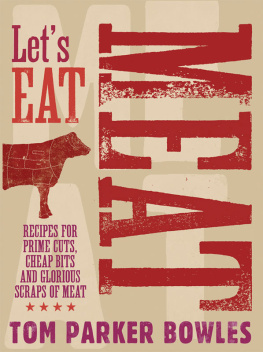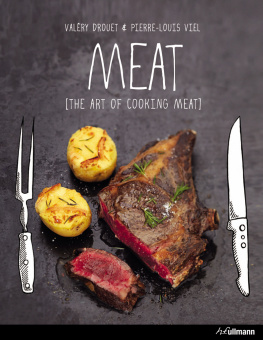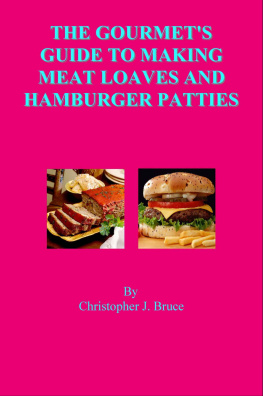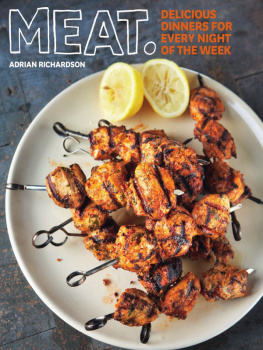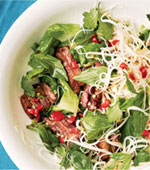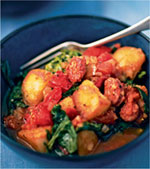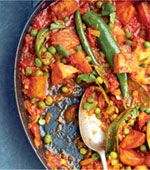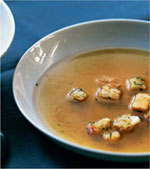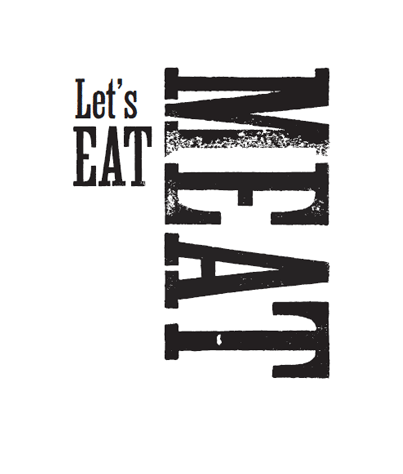



CONTENTS

INTRODUCTION
This is a book about meat. No surprises there. The title rather gives it away. But rather than batter you about the head with a frozen leg of lamb while ordering you to feast on more flesh, Im proposing we should eat less.
If there is anything as lofty as a philosophy coursing through this book, its this: eat meat, but eat less, and eat better. Im not saying we should stint on great hunks of beef, carved tissue-paper thin and drowned in torrents of glistening gravy. Nor forgo thick, . These are not so much everyday dishes, but feasts to relish. Its these recipes that make up the bulk of the first chapter, Meat.
In the Less Meat chapter, things get, well, a little less carnivorous. Meat still plays a role in the recipes, but is no longer the star. It shares the spotlight with potatoes, rice, pasta or pastry. Hardly the most arduous of tasks, I know. From a mighty Britalian .
And then theres Meat as Seasoning, a chapter devoted to little blasts of flavour that a pork bone can give to a broth or a few shreds of bacon to a bowlful of beans. The flavours still zip across the tongue, hot, salty, sour or sweet, but the meat is happy, indeed demands, to take more of a backseat role. A cameo, if you will, but one essential to the final plot. Marlon Brando in Superman, Judi Dench in Shakespeare in Love. Think of Americas Deep South, with its with pork mince, and endless ways with preserved pig. Necessity is the mother of invention and all that.
Not forgetting game and offal, that woefully under-rated pair of flavour saviours.. Nothing to fear, everything to embrace.
Theres even a chapter called No Meat. This isnt some half-hearted, tacked-on and entirely spurious section at the back, rather an integral part of the book. These are dishes to eat alongside meat or even, dare I say it, by themselves. Good food is about flavour, and Im equally happy eating beautifully spiced aloo dum as I am attacking a rib of beef.
Because in the rich, well-padded Western world, we eat too much meat. Way, way too much. The vast majority is from chickens. And most are not the happily scratching, born-free Chicken Lickens that peck and cluck around the farmyard floor, scratching for grubs and awaiting the imminent implosion of the sky. No, these are wretched, much-abused beasts, animals as mere financial unit. Even the most callous and blood-stained of carnivores might struggle to support a system of farming where the chickens legs buckle under the weight of their grotesquely (and unnaturally) inflated breasts. We like breasts, you see, caring little that they usually taste of the square root of bugger all.
Intensively farmed birds are bred for quick profit, rather than deep flavour, and to aid this unnatural process, the birds are routinely dosed with antibiotics. This not only produces unhappy, inferior-tasting birds, but when passed on to us through the food chain, actually stops prescribed drugs doing what they should. Already there are certain strains of bacteria against which conventional antibiotics have no hope. Scary stuff.
The intensively farmed pigs get an equally abhorrent deal. Because, unluckily for them, these highly intelligent beasts respond well to all manner of strange scientific tinkering. Their diet is cheap and high in protein (to make them grow to weight more rapidly) and they often end their short, miserable lives in vast slaughterhouses that dont manage to kill them properly, often just leaving them stunned before theyre fed into artificial infernos, meant to singe off the bristles. The world of intensive farming is as myopic as it is cruel. Everyones a loser in the constant quest for cheap meat. And its long-term costs are immense: to the animals welfare, to our planet and to our health.
As Alex Renton writes in his excellent Planet Carnivore, cheap meat means corners cut on safety, health and welfare: humane treatment generally slows down the production line. Which is why good, ethically produced meat is more expensive. To allow a pig, chicken, cow or sheep to grow naturally costs more money. As does a varied, high-quality feed.
Intensive farming is responsible for wildlife decimation, as natural habitats are ripped up, soils rendered arid and infertile by the constant flood of herbicides and pesticides. In America, its got to the point where bees have to be trucked in to pollinate the Californian almond blossom. The chemicals used in the mass production of these nuts have simply obliterated the native swarm. These sort of facts chill me to the bone. In Philip Lymberys Farmageddon: The True Cost of Cheap Meat, he travels the globe, reporting on the nicotine-stained smogs that lurk above the super-dairies, and the river of effluent that leaches into the water table, river and sea, a by-product of the vast, unthinking farming of chickens and pigs and cows on a near super-human scale. Now Im no hippy. But really, this has gone too far. Its down to us to act.
You only have to look at the horsemeat scandal of 2013 to find out how little most of us know about the meat were eating. I have no problem with a good horse tartare. But if I order beef, I do like to know it comes from a mooer, rather than a neigher. And if youre getting a frozen burger for about five pence, you can be fairly sure theres a lot of cheap filler in there. And perhaps a soupon of Shergar.
But what about the folk who cant afford to drop 10 on a decent chicken? Good-quality meat, they argue, is a rich mans treat, for the smug, Prius-driving, Ocado-shopping, middle-class elite. But do we really need to eat meat every day? By giving it a rest sometimes, youll have more cash to spend on the good stuff. And if you do buy a decent chicken, not only will your taste buds rejoice, but you will get three meals rather than one. The roast chicken, chicken sandwiches the next day and, every bit as thrilling, proper stock made from the bones. Its plain culinary common sense.
I may still be many hundreds of miles removed from being a full-time vegetarian. But the older I get, the more joy I find in legumes and sheer delight in every form of vegetable, be it green and leafy or a root, covered in soil. The idea of a meat-free Monday or Tuesday or whenever is simple: dont stop eating meat, rather have one day a week without it. Its sensible and pragmatic, and really what this book is about.
Next page
